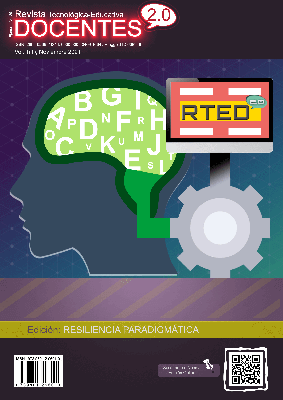Use of Technological Tools in Times of COVID-19
 DOI:
https://doi.org/10.37843/rted.v1i1.223
DOI:
https://doi.org/10.37843/rted.v1i1.223
Main Article Content
Abstract
COVID-19 came to affect the whole world in different areas; the World Health Organization (WHO) on March 11, 2020, declared: the virus outbreak can be characterized as a pandemic, derived from the increase in the number of existing cases, considering a public health emergency of international relevance. The objective of this research was to analyze the didactic strategies of the new role of the teaching-learning process entirely at a distance with educational, technological tools in the face of COVID-19. The methodology used was a quantitative, descriptive cross-sectional approach through a questionnaire in Google form, some responses based on the Likert scale, others closed, with a random sample of 200 students from the Centro Universitario del Norte University of Guadalajara, Mexico. It was found that the actors have an unfavorable opinion in some teachers regarding the knowledge and use of a variety of technological tools within the distance teaching-learning process, respecting their class schedule of the virtual educational program, with social networks being a vital communication factor during confinement. With these findings, new educational policies with the integration of ICTs were proposed, training teachers as students on various educational tools.
Downloads
Metrics
Article Details

This work is licensed under a Creative Commons Attribution-NonCommercial-NoDerivatives 4.0 International License.
Those authors who have publications in our journal accept the following terms:
- When a work is accepted for publication, the author retains rights of reproduction, distribution of his/her article for exploitation in all countries of the world in the format provided by our magazine and any other magnetic medium, optical, and digital.
- Authors will retain their copyright and guarantee the journal the right first to publish their work, which will be simultaneously subject to the Creative Commons Acknowledgment License (Attribution-NonCommercial-NoDerivatives 4.0 International (CC BY-NC-ND 4.0)). That allows third parties to copy and redistribute the material in any medium or format, under the following conditions: Acknowledgment - You must properly acknowledge authorship, provide a link to the license, and indicate if any changes have been made. You may do so in any reasonable way, but not in a way that suggests you have the licensor's endorsement or receive it for your use. NonCommercial - You may not use the material for a commercial purpose. NoDerivatives - If you remix, transform, or build from the material, you cannot broadcast the modified material. There are no additional restrictions - You cannot apply legal terms or technological measures that legally restrict you from doing what the license allows.
- Authors may adopt other non-exclusive license agreements to distribute the published version of the work (e.g., deposit it in an institutional archive or publish it in a monographic volume) provided that the initial publication in this journal is indicated.
- Authors are allowed and recommended to disseminate their work through the Internet (e.g., in institutional telematic archives, repositories, libraries, or their website), producing exciting exchanges and increasing the published work's citations.
- Request of withdrawal an article has to be done in writing by the author to the Editor, becoming effective after a written response from the Editor. For this purpose, the author or authors will send correspondence via e-mail: [email protected].
- The author will not receive financial compensation for the publication of his work.
- All Docentes 2.0 Journal publications are under the Open Journal System (OJS) platform at: https://ojs.docentes20.com/.
References
Barráez, D. P. (2020). La educación a distancia en los procesos educativos: Contribuye significativamente al aprendizaje. Revista Tecnológica-Educativa Docentes 2.0, 8(1), 41–49. Recuperado a partir de https://ojs.docentes20.com/index.php/revista-docentes20/article/view/91
Cacheiro, G.M. (2018). Educación y tecnología: estrategias didácticas para la integración de las TIC Ciencias Sociales y Jurídicas. UNED.
CEPAL (Comisión Económica para América Latina y el Caribe). (2020) La educación en tiempos de la pandemia COVID-19. CEPAL; Unesco. https://www.cepal.org/es/publicaciones/45904-la-educacion-tiempos-la-pandemia-covid-19
Consejo de Salubridad General. (2020). Requisito Certificación Hospitales. Diario Oficial de la Federación. http://www.csg.gob.mx/descargas/pdf/index/informacion_relevante/Requisito_Certificacion_Hospitales.pdf
Del Canto, E. & Silva-Silva, A. (2013). Metodología cuantitativa: abordaje desde la complementariedad en ciencias sociales. Revista de Ciencias Sociales (Cr), III (141) ,25-34. https://www.redalyc.org/articulo.oa?id=15329875002 DOI: https://doi.org/10.15517/rcs.v0i141.12479
Escamilla, J. (2007). Hacia un aprendizaje flexible sin fronteras y limitaciones tradicionales. En Lozano-Rodríguez, A. & Burgos-Aguilar, J. (Eds). Tecnología educativa en un modelo de educación a distancia centrado en la persona. (pp.21-52). Limusa.
Molina-García. L. (2014). Los entornos virtuales como espacios de enseñanza y aprendizaje. ic editorial.
Müggenburg-Rodríguez V., & Pérez-Cabrera, I. (2007). Tipos de estudio en el enfoque de investigación cuantitativa. Enfermería Universitaria, 4 (1), 35-38. https://www.redalyc.org/articulo.oa?id=358741821004 DOI: https://doi.org/10.22201/eneo.23958421e.2007.1.469
Peña-Pérez, R. (2013). Uso de las TIC en la vida diaria. Alfaomega
Sacatinta, M.D. (2011). Tipos de investigación científica. Revista de Actualización Clínica Investiga. Vol.12. pp. 621-624. http://www.revistasbolivianas.org.bo/scielo.php?script=sci_arttext&pid=S2304-37682011000900011&lng=es&nrm=iso
Salinas, O. P. (2010). Modelo educativo y recursos tecnológicos. En Lozano R. A. & Burgos, A. B. (comps.). Tecnología educativa un modelo de educación a distancia centrado en la persona. Limusa.






